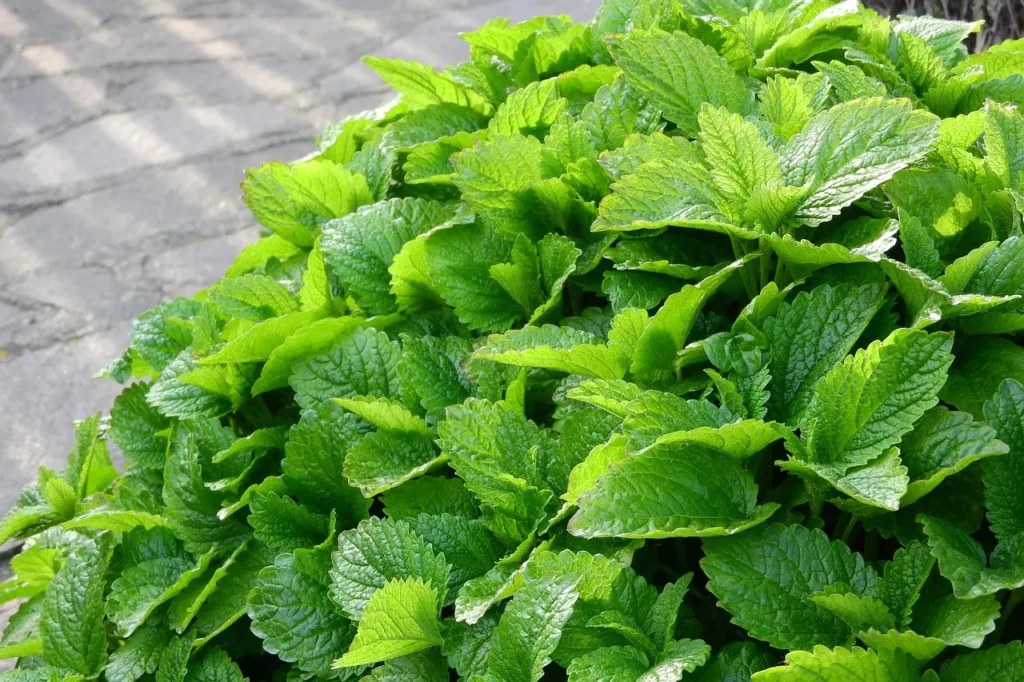
Lemon Balm
Introduction to Lemon Balm
Lemon balm (Melissa officinalis) is a perennial herb that belongs to the mint family. Lemon balm is a bushy, herbaceous plant that can grow up to 70 cm (28 inches) tall. It has green, heart-shaped leaves that are slightly hairy and emit a strong lemon scent when crushed or rubbed. The plant produces small, white or pale pink flowers that bloom in the summer months. The plant is known for its distinctive lemon-like aroma and flavor, which comes from its essential oils. The herb’s lemony flavor pairs well with fish, poultry, and dairy products.
The active ingredients of lemon balm include:
- Eugenol: A phenolic compound responsible for the herb’s sedative and calming effects.
- Tannins: These compounds contribute to the herb’s antiviral properties and are involved in many of its biological activities.
- Terpenes: These plant chemicals play a role in the herb’s relaxing and antiviral effects.
- Flavonoids: These bioactive compounds are associated with antioxidant and anti-inflammatory activities.
- Phenolic acids: Compounds such as rosmarinic acid, caffeic acid, and gallic acid are present in lemon balm and contribute to its antioxidant and antimicrobial properties.
- Flavonoids: Compounds like cynaroside, cosmocin, rhamnocitrin, and isoquercitrin are also present in lemon balm and have antioxidant and anti-inflammatory effects.
- Triterpene acids: Ursolic and oleanolic acids are present in lemon balm and have antioxidant and anti-inflammatory activities.
These active ingredients contribute to the diverse biological activities of lemon balm, including its potential uses in treating various health conditions such as cold sores, anxiety, stress, insomnia, indigestion, and dementia.
Medicinal Properties
Lemon balm has been used for centuries in traditional medicine to treat various ailments. Modern research suggests that the herb may have the following health benefits:
- Anxiety and Stress Relief: Lemon balm has been studied for its potential to reduce anxiety and stress. A small pilot study found that consuming a sweetened water-based drink containing 0.3 grams of lemon balm extract reduced stress and anxiety in participants within one to three hours after consumption.
- Sleep Quality Improvement: Combining lemon balm with valerian root has been shown to significantly improve sleep quality in menopausal women compared to other treatments.
- Cold Sores: Lemon balm has been found to have antimicrobial properties, which could help in the treatment of cold sores. Applying a lotion containing lemon balm extract to cold sores has been shown to shorten healing time and reduce symptoms.
- Antioxidant Properties: Lemon balm contains flavonoids and other phytochemicals that provide antioxidant activity, which can help protect against oxidative damage and cell damage.
- Neuroprotective Effects: Lemon balm has been found to have neuroprotective properties, which could be beneficial in the prevention and treatment of neurodegenerative diseases.
We export high-quality lemon balm sourced from sustainable farms. To inquire about purchasing lemon balm or other botanical ingredients, please contact us.
